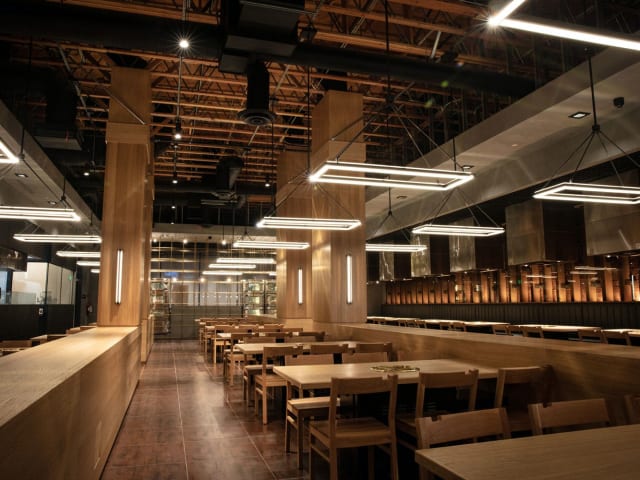Daedo Sikdang
Premium ribeye steakhouse grilling cuts tableside, from 1964 Seoul
Premium ribeye steakhouse grilling cuts tableside, from 1964 Seoul
:no_upscale()/cdn.vox-cdn.com/uploads/chorus_asset/file/22719670/2021_07_14_Daedo_035.jpg)
:no_upscale()/cdn.vox-cdn.com/uploads/chorus_asset/file/22719655/2021_07_14_Daedo_007.jpg)
/cdn.vox-cdn.com/uploads/chorus_image/image/69587588/2021_07_14_Daedo_053.0.jpg)
:no_upscale()/cdn.vox-cdn.com/uploads/chorus_asset/file/22719781/2021_07_14_Daedo_022.jpg)
:no_upscale()/cdn.vox-cdn.com/uploads/chorus_asset/file/22719766/2021_07_14_Daedo_020.jpg)
:no_upscale()/cdn.vox-cdn.com/uploads/chorus_asset/file/22719759/2021_07_14_Daedo_057.jpg)
:no_upscale()/cdn.vox-cdn.com/uploads/chorus_asset/file/22719755/2021_07_14_Daedo_002.jpg)
:no_upscale()/cdn.vox-cdn.com/uploads/chorus_asset/file/22719776/2021_07_14_Daedo_010.jpg)
:no_upscale()/cdn.vox-cdn.com/uploads/chorus_asset/file/22719659/2021_07_14_Daedo_011.jpg)

:no_upscale()/cdn.vox-cdn.com/uploads/chorus_asset/file/22719762/2021_07_14_Daedo_058.jpg)
:no_upscale()/cdn.vox-cdn.com/uploads/chorus_asset/file/22719681/2021_07_14_Daedo_050.jpg)
:no_upscale()/cdn.vox-cdn.com/uploads/chorus_asset/file/22719661/2021_07_14_Daedo_009.jpg)

:no_upscale()/cdn.vox-cdn.com/uploads/chorus_asset/file/22719765/2021_07_14_Daedo_043.jpg)

:no_upscale()/cdn.vox-cdn.com/uploads/chorus_asset/file/22719754/2021_07_14_Daedo_016.jpg)
:no_upscale()/cdn.vox-cdn.com/uploads/chorus_asset/file/22719730/2021_07_14_Daedo_052.jpg)
:no_upscale()/cdn.vox-cdn.com/uploads/chorus_asset/file/22719669/2021_07_14_Daedo_045.jpg)
:no_upscale()/cdn.vox-cdn.com/uploads/chorus_asset/file/22719675/2021_07_14_Daedo_040.jpg)

:no_upscale()/cdn.vox-cdn.com/uploads/chorus_asset/file/22719667/2021_07_14_Daedo_025.jpg)
:no_upscale()/cdn.vox-cdn.com/uploads/chorus_asset/file/22719647/2021_07_14_Daedo_003.jpg)
:no_upscale()/cdn.vox-cdn.com/uploads/chorus_asset/file/22719665/2021_07_14_Daedo_030.jpg)

:no_upscale()/cdn.vox-cdn.com/uploads/chorus_asset/file/22719768/2021_07_14_Daedo_021.jpg)
:no_upscale()/cdn.vox-cdn.com/uploads/chorus_asset/file/22719658/2021_07_14_Daedo_008.jpg)
:no_upscale()/cdn.vox-cdn.com/uploads/chorus_asset/file/22719757/2021_07_14_Daedo_054.jpg)
:no_upscale()/cdn.vox-cdn.com/uploads/chorus_asset/file/22719671/2021_07_14_Daedo_037.jpg)
:no_upscale()/cdn.vox-cdn.com/uploads/chorus_asset/file/22719753/2021_07_14_Daedo_018.jpg)






















"Represents a more modern approach to Korean barbecue preparations in Koreatown." - Rebecca Roland
"A more upscale take on Korean barbecue — described as a Korean barbecue specialist from Seoul — where the interior immediately sets the tone with warm brick walls, light wood tables, and a minimalist open-concept dining room. While the meat may be more expensive than some other spots around Koreatown, "its quality justifies the price." Orders should always include the signature Daedo cut of beef with ribeye roll, ribeye cap, and ribeye strip; once meat is decided on, "order enough side dishes like doenjang stew, gyeran-jjim (steamed egg), and yolmu cold noodle to cover the table." — Rebecca Roland, editor, Eater Southern California/Southwest" - Eater Staff
"This very intentional Korean barbecue spot from Seoul serves just American-certified Angus prime beef, and only ribeye steaks at that. Seared on specialized cast iron skillets, diners will try ribeyes sliced into three distinct cuts and served with kkakgudi and other banchan that are fermented in Korea and shipped to the U.S. Try the cold yeolmu guksu to wash it all down." - Cathy Park

"Kisa Sikdang is a spacious Koreatown restaurant (previously seafood palace Oyabun) where the menu consists of large set meals with a choice of protein, plus rice and lots of banchan—an homage to Korea’s “taxi driver” restaurants where quick, affordable spreads were designed to fill up cabbies in a hurry. The bulgogi is pleasantly onion-y, the spicy stir-fried squid is great for building ssam with perilla leaves, and banchan options like glass noodles, jeon, and wood ear mushrooms are all solid. A filling lunch at Kisa Sidang costs under $20, and dinner costs under $30. Though we have other spots we like better for traditional Korean cooking, if you’re looking for a restaurant large enough to fit a group and feed everyone without maxing out your card, Kisa is a good option." - Sylvio Martins

"This very intentional Korean barbecue spot from Seoul serves just American-certified Angus prime beef, and only ribeye steaks at that. Seared on specialized cast iron skillets, diners will try ribeyes sliced into three distinct cuts and served with kkakgudi and other banchan that are fermented in Korea and shipped to the U.S. Try the cold yeolmu guksu to wash it all down." - Matthew Kang
